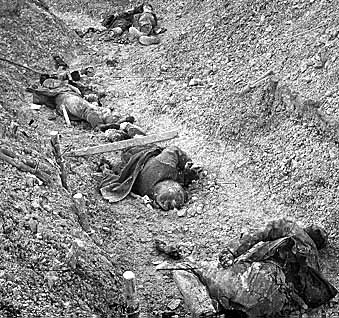|

Wilfred Edward Salter Owen was born on March 18, 1893, he was the oldest of four children of Tom and Susan Owen.
As a young child Wilfred Owen's family experienced financial difficulties which resulted in him having to attend the Birkenhead
Insitute and the Technical School of Shrewsbury, not his dream school in Oxford.
As a child his faith in religion was very strong, something that he had dearly shared with his mother. This close
relationship he had with his religion failed him, though. As he got older his attention was drawn towards poety, in
which he held his version of Truth that he could not reconcile with God.
Notably known as a war poet, the beginning of war found Owen in France, but as a tutor rather than as a soldier.
It was during this time that he met Laurent Tailhade, a poet known in the French Salons. The many aspirations of a young Wilfred
Owen to become a renowed poet had grown in his association with the social circles of upper class he longed to be a part of.
Moreover, Wilfred Owen experienced much in his writings of poetry because of the constant conflict with his duty
in war. Through the help of Dr. Arthur Brock Owen was inspired to utilize his far past to overcome the recent past. He used
Owen's ability and desire for writing to help him unite an artist and a soldier, two aspects that describe Wilfred Owen as
a person.
Furthermore, Wilfred Owen's health began to decline as a result of war. His untimely death occurrd during an attack
during war in which he attempted to cross on a raft after the bridge and most of the company he had belonged to. As a
result he was caught in the crossfire and later died. After his death it can be seen how Owen dealt internally with his own
war which was evident through an intensity personal battle for expression of real emotion and an inclusion of his experience
into life. Moreover, his real battle had been to keep his poetry alive.
|
 |
Anthem for Doomed Youth by Wilfred Owen
What passing-bells for these who die as cattle?
Only
the monstrous anger of the guns.
Only the stuttering rifles' rapid rattle
Can patter out their hasty orisons.
No
mockeries now for them; no prayers nor bells,
Nor any voice of mourning save the choirs, -
The shrill,
demented choirs of wailing shells;
And bugles calling for them from sad shires.
What candles may be held to speed them all?
Not in the hands
of boys, but in their eyes
Shall shine the holy glimmers of goodbyes.
The pallor of girls' brows shall
be their pall;
Their flowers the tenderness of patient minds,
And each slow dusk a drawing-down of blinds.

|